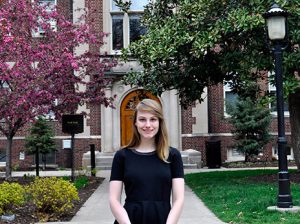Published on
Updated on

2015 Mark Twain Fellowships Recipient
Jessica arrived in Columbia as a Walter Williams Scholar in the Missouri School of Journalism, with a notion of becoming a war correspondent, so she studied International Journalism, along with Psychology and Political Science to provide a strong foundation of the people, places, and politics that would undergird her writing about current affairs around the world. She interned in Brussels through a Journalism School program, and was later “selected to travel to Yangon, Myanmar to report on the state of Myanmar’s free press (or lack thereof) as the country emerged from decades of oppressive military rule.” After those two high-impact weeks in Myanmar, Jessica yearned to “gain a theoretical understanding of conflict, as well as practical knowledge of conflict mediation skills.”
Even as a young girl in New Orleans, Jessica had “grasped the complexity of reconstruction” in the aftermath of Hurricane Katrina, but in Myanmar, as a 21-year-old, she felt more deeply “the powerlessness to confront … government failure and ongoing conflict in only 800 words.” Jessica had thought that as a correspondent she could “amplify the voices and stories of those affected by conflict,” but she came to realize that she needed to do more than write stories about the destruction inherent in war and other forms of violent conflict. Instead, she decided she could use her journalistic skills to “empower others to create positive change in their countries by implementing … development projects” that lead to real change for the benefit of those struggling to overcome the residual effects of colonialism and subsequent internal conflicts.
A year ago, Jessica graduated from Trinity College Dublin, with distinction, completing an MPhil in Conflict Resolution and Reconciliation, and “discovered a passion for understanding the ways in which media tools can be used for relationship building and prejudice reduction in segregated, post-conflict societies.” She spent most of her time in Belfast, “immersed . . . in a city transitioning out of violent conflict. Each day offered chances to better understand both the conflict itself and the subsequent peace process, whether it was through conversations with professors, neighbors, and taxi drivers, walking past the sectarian murals and peace walls near my apartment, or working with organizations grappling with ongoing trauma in the community.” She interned with a trauma center that served people injured in or bereaved by the Troubles, interviewing “family members of people murdered as a result of sectarian violence, both before and after the official peace process. Drawing from those interviews, I recorded their stories as book chapters dedicated to each individual’s or family’s loss. Through this experience, I learned the power of media and storytelling as a way both to heal and to confront prejudice.”
During her program, Jessica was chosen as one of two students to represent her university in Jerusalem, “researching the ongoing conflict [and its] wider regional implications,” and she conducted additional research in Cape Town—both trips covered through the Mark Twain Fellowship. Last winter she began doctoral work at the University of Cape Town, where she is “designing a research project studying the use of visual media for contact, relationship building, and prejudice reduction.”
Jessica told me that applying for fellowships as a senior “entailed … countless written drafts, numerous interviews, and hours of introspection.” Those many hours have taken her to three continents and international connections, and she takes “great pride every time I get to speak about Mizzou to professors, peers, and now the students I have taught [in courses on Gender & Development, Media & Society, and Film & Television] many of whom knew nothing about the University of Missouri prior to those conversations. I am exceptionally grateful for the opportunities I’ve had both as a Mizzou alumna and a Mark Twain Fellow, and I’m certain that I would not be where I am today had it not been for those opportunities.”